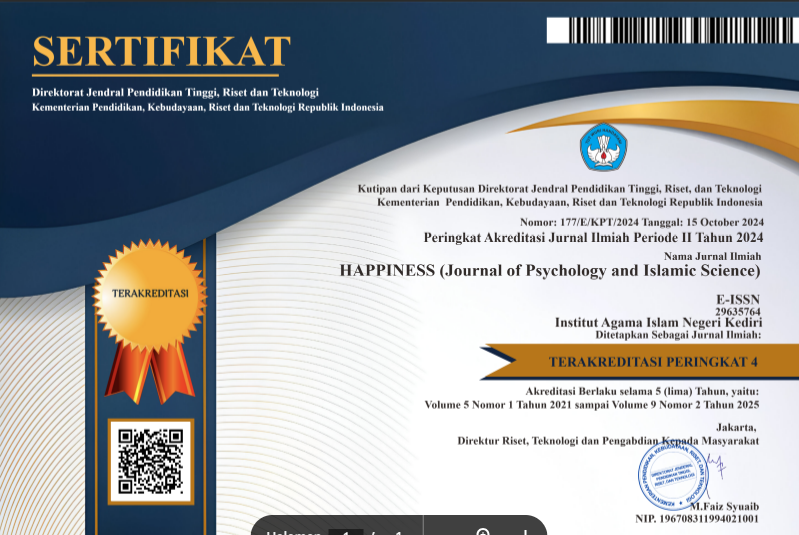Peningkatan Kemampuan Asertif melalui Terapi Perilaku Kognitif: Menyelami Dampak Positif dalam Pengembangan Komunikasi Personal
DOI:
https://doi.org/10.30762/happiness.v7i2.960Keywords:
Cognitive behavior therapy, assertive behavior, Special Education TeacherAbstract
This research aims to explore the impact of Cognitive Behavior Therapy (CBT) on assertive behavior among Special Education Teachers (SETs). Due to the heavy workload and demands, teachers may experience cognitive disturbances. The study employs a quantitative experimental approach, focusing on a single participant, a 23-year-old SET named PAS, a new teacher in an Inclusive School for Special Needs in Kab Blitar, with low assertive behavior based on interview assessments, observations, graphic tests (BAUM, DAP & HTP), Wartegg, CFIT, and assertiveness scales. Sampling is done purposively. The Assertiveness Inventory serves as the research instrument, administered over eight sessions lasting 60 minutes each. Pre-test and post-test evaluations were conducted to assess changes. The findings indicate an improvement in assertive behavior for the participant, as evidenced by an increase in assertive behavior scores on the Assertiveness Inventory scale. Additionally, a reduction or elimination of negative thoughts and behaviors in the participant was observed. This research is vital for understanding how CBT can effectively enhance assertive behavior, particularly in the context of special education teachers facing significant work-related challenges. The results provide a foundation for developing interventions or programs that can be broadly applied to help educators enhance their assertive communication skills. Moreover, the study sheds light on the positive impacts anticipated from integrating cognitive behavior therapy in the development of assertive behavior.
Downloads
References
Alberti, R. E., & Emmons, M. L. (2002). Your perfect right (Terjemahan. PT Elex Media Komputindo.
Ansori, M. (2020). Metode Penelitian Kuantitatif Edisi 2. Airlangga University Press.
Astuti, F. Q. R. zsuci. (2023). Prokrastinasi Akademik Saat Perkuliahan Daring Ditinjau dari Self–Regulated Learning. Jurnal Penelitian Psikologi, 3441(7), 1–6.
Fennel, D. (2008). Ecotourism. Edisi Ketiga. Routledge.
Galassi, M. D., & Galassi, J. P. (1977). Assess Yourself: How to be Your Own Person. Human Sciences Press.
Gasezadeh, A. (2006). Effect of cognitive-behavioral therapy in reduce anxiety and increase assertiveness.
Hasibuan, M. A. H., Purwanto, E., & Japar, M. (2018). Effectiveness of group counseling cognitive behavior therapy cognitive restructuring technique and assertive skill training to improve assertive behavior students. Jurnal Bimbingan Konseling, 7(1), 55–62. https://doi.org/10.15294/JUBK.V7I1.22609
Holmes, J., N, R., Tarrier, N., Hmshelvood, M. B., & Bolsover, N. (2002). All you reed is cognitive behavior therapy? British Medical Journal, 3249, 288–295. https://doi.org/10.1136/bmj.324.7332.288
Ilkhchi, S. V, Poursharifi, H., & Alilo, M. M. (2011). The effectiveness of Cognitive Behavioral Group Therapy on selfefficacy and assertiveness among anxious female students of high schools. Social and Behavioral Sciences, 30, 2586 – 2591. https://doi.org/10.1016/J.SBSPRO.2011.10.506
Jacobs, K. M., & Cochran, D. S. (1980). The effect of cognitive restruction on assertive behavior. Cognitive Behavior Therapy and Research, 6(1), 63–76.
Kazdin, A. E. (2000). Encyclopedia of Psychology: 8 Volume Set. American Psychological Association.
Khan, R. I. (2012). Perilaku asertif, harga diri dan kecenderungan depresi. Persona: Jurnal Psikologi Indonesia, 1(2), 143–154.
Kurniawan, Y., & Sulistyarini, I. (2014). Terapi Kognitif Perilaku untuk Mengurangi Episode Depresi Berat dengan Gejala Psikotik. PHILANTHROPY: Journal of Psychology, 1(1), 65–75.
Laidlaw, dkk. (2003). Cognitive behavior therapy with older people. John Wiley & Sons Ltd.
Maulidia, F. N., & Djuwita, E. (2021). Penerapan Teknik Cognitive Behaviour Group Therapy dalam Meningkatkan Perilaku Asertif pada Remaja Awal. Jurnal Psikogenesis, 9(1), 55–70. https://doi.org/10.24854/jps.v9i1.1810
Nelson-Jones, R. (2015). Teori dan Praktik Konseling dan Terapi. Pustaka Pelajar.
Parray, W. M., & Kumar, S. (2017). Impact of assertiveness training on the level of assertiveness, self-esteem, stress, psychological well-being and academic achievement of adolescents. Indian Journal of Health and Wellbeing, 8(12), 1476–1480. https://doi.org/10.12691/ajnr-6-6-27
Prihatin. (1993). Latihan Asertif untuk anak melalui sosiodrama. Kreatif Media.
Qamaria, R. S., & Astuti, F. (2023a). Adopting a cognitive information processing approach to increase students’ career maturity. Cakrawala Pendidikan, 40(3), 593–603.
Qamaria, R. S., & Astuti, F. (2023b). INCREASING LEARNING MOTIVATION IN ADOLESCENT THROUGH BEHAVIORAL. Proyeksi, 18(1), 1–22.
Rathus, S. A., & Nevid, J. S. (1993). Adjustment and Growth: The Challenges of Life (2nd ed.). CBS College Publising.
Richard, S. T. A. (2007). What is comprehensive cognitive – behavioural therapy? Social anxiety institute Inc.
Sarafino, E. P., & Smith, T. W. (2017). Health Psychology: Biopsychosocial Interactions. Wiley.
Sari, N. W., Yusmansyah, Y., & Utaminingsih, D. (2004). Pengaruh teknik sosiodrama untuk peningkatan perilaku asertif siswa. ALIBKIN (Jurnal Bimbingan Konseling, 3(4).
Speed, B. C., Goldstein, B. L., & Goldfried, M. R. (2017). Assertiveness training: A forgotten evidence-based treatment. clinical psychology. Science and Practice, 25(1).
Sugiantoro, B. (2018). Teknik Desensitisasi Sistematis (Systematic Desensitization) dalam Mereduksi Gangguan Kecemasan Sosial (Social Anxiety Disorder) yang dialami Konseli. Nusantara of Research : Jurnal Hasil-hasil Penelitian Universitas Nusantara PGRI Kediri, 5(2), 72–82. https://doi.org/10.29407/nor.v5i2.13078
Sugiyono. (2019). Metode Penelitian Kuantitatif, Kualitatif dan R& D (Sutopo (ed.); 2 ed.). Alfabeta.
Vagos, P., & Pereira, A. (2019). Towards a cognitive-behavioral understanding of assertiveness: Effects of cognition and distress on different expressions of assertive behavior. Journal of Rational-Emotive & CognitiveBehavior Therapy, 37(2), 133–148. https://doi.org/10.1007/s10942-018-0296-4
Yong, F., & L. (2010). A study on the assertiveness and academic procrastination of English and communication students at a private university. American Journal of Scientific Research, 9, 62–72.
Zulkaida, A. (2010). Pelatihan asertif untuk meningkatkan tingkah laku asertif pada mahasiswa (Pendekatan kognitif-perilaku)[Tesis, Universitas Indonesia. http://lib.ui.ac.id/bo/uibo/detail.jsp?Id=20343556&lokasi=lokal.
Downloads
Published
How to Cite
Issue
Section
License
Copyright (c) 2023 Defi Astriani, Alaiya Choiril Mufidah, Dessy Farantika, Safina Dwi Prastika

This work is licensed under a Creative Commons Attribution-ShareAlike 4.0 International License.





















